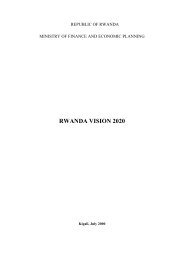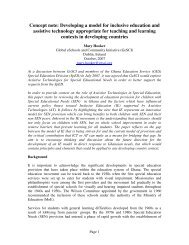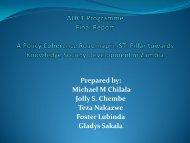African Leadership in ICT Needs Analysis South Africa - GeSCI
African Leadership in ICT Needs Analysis South Africa - GeSCI
African Leadership in ICT Needs Analysis South Africa - GeSCI
Create successful ePaper yourself
Turn your PDF publications into a flip-book with our unique Google optimized e-Paper software.
Education General Policies, Strategies & Frameworks – Access, Quality, Equity, Curriculum<br />
The Bill of Rights <strong>in</strong> the <strong>South</strong> <strong><strong>Africa</strong>n</strong> Constitution 12 (RSA, 1996a) stipulates that “everyone has<br />
the right to a basic education, <strong>in</strong>clud<strong>in</strong>g adult basic education; and further education, which the<br />
State, through reasonable measures, must make progressively available and accessible”.<br />
Accord<strong>in</strong>g to the <strong>South</strong> <strong><strong>Africa</strong>n</strong> Schools Act (RSA, 1996), school<strong>in</strong>g is compulsory for children<br />
aged 7‐15 or attendance <strong>in</strong> Grades 1 to 9, whichever comes first. School life spans 13 years or<br />
grades, from grade 0, otherwise known as grade R or "reception year", through to grade 12 or<br />
"matric" ‐ the year of matriculation. The basic education has six phases namely:<br />
• Foundation phase <strong>in</strong>corporates grades R to 3<br />
• Intermediate phase <strong>in</strong>corporates grades 4 to 6<br />
• Senior phase <strong>in</strong>corporates grades 7 to 9<br />
• Further education and tra<strong>in</strong><strong>in</strong>g (FET) <strong>in</strong>corporates grades 10 to 12<br />
In 2009, <strong>South</strong> <strong>Africa</strong> had 32,104 educational <strong>in</strong>stitutions. These <strong>in</strong>cluded 25,906 ma<strong>in</strong>stream<br />
schools and <strong>in</strong>stitutions and 6,197 other educational <strong>in</strong>stitutions, namely, special schools, Early<br />
Childhood Development (ECD) sites, public Adult Basic Education and Tra<strong>in</strong><strong>in</strong>g (ABET) centres,<br />
public FET <strong>in</strong>stitutions and public high education <strong>in</strong>stitutions (HEIs).<br />
A M<strong>in</strong>isterial Committee for Learner Teacher Support Material (LTSM) was constituted <strong>in</strong><br />
February 2010, based on a recommendation from the Review Task Team of 2009 for the<br />
Department of Basic Education (DBE) 13 . In the DBE drive to strengthen and support curriculum<br />
implementation <strong>in</strong> <strong>South</strong> <strong><strong>Africa</strong>n</strong> schools, textbooks and other educational resources are crucial<br />
factors <strong>in</strong> ensur<strong>in</strong>g improved educational performance. In general the LTSM Committee focused<br />
on recommendations that would ensure good quality material be<strong>in</strong>g made available to all<br />
schools as a start<strong>in</strong>g po<strong>in</strong>t. Other issues such as good comb<strong>in</strong>ations of material <strong>in</strong> classrooms<br />
and support<strong>in</strong>g teacher development regard<strong>in</strong>g LTSM are expected to develop over time<br />
through susta<strong>in</strong>ed focus. The recommendations by the committee are summarised as follows:<br />
• National Catalogue: The Committee recommends a national LTSM catalogue, per grade<br />
and subject, be developed. This should comprise of no more than 8 comparable items.<br />
Page 12 of 55<br />
<strong><strong>Africa</strong>n</strong> <strong>Leadership</strong> <strong>in</strong> <strong>ICT</strong>, AL<strong>ICT</strong> - http://www.gesci.org/african-leadership-<strong>in</strong>-ict-alict.html





